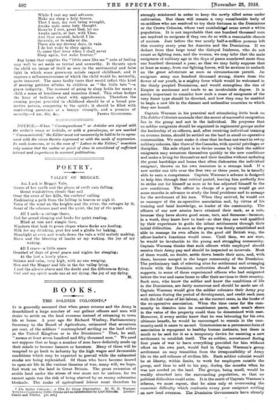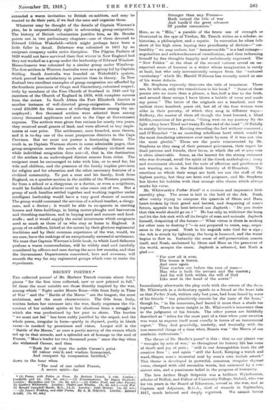BOOKS.
THE SOLDIER COLONISTS.*
IT is generally assumed that when peace returns and the Army is demobilized a large number of our gallant officers and men will desire to settle on the land overseas instead of returning to town life at home. A year ago Sir Richard Winfrey, Parliamentary Secretary to the Board of Agriculture, esti,mated that seventeen per cent, of the soldiers "contemplated settling on the land either in the United Kingdom or in the Dominions." That, he said, "means at least seven hundred and fifty thousand men." We need not suppose that so large a number of men have definitely rnade ip their minds to become farmers or foresters. Many of them will be tempted to go back to industry by the high wages and favourable conditions which may be expected to prevail while the exhausted stocks are being replenished. Of those who have become inured to open-air life in the various theatres of war, many will, we hope, find work on the land in Great Britain. The great extension of arable land under the stress of war must not be undone, for we cannot again run the risk of being starved by an enemy submarine blockade. The ranks of agricultural labour must therefore be • The Soldier Colonists : a Plea for Group Organisation. By W, H. Warman. With two Chapters by Collin Brooks and an Introduction by Lord Belboram. London: Cludto and Windua. net.1 strongly reinforced in order to keep the newly tilled areas under cultivation. But there will remain a very considerable body of ex-soldiers-who are resolved to try their fortunes in the Dominions or the Crown Colonies, where vast uninhabited areas await a white population. It is not improbable that one hundred thousand men are resolved to emigrate if they can do so with ft reasonable chance of success. Just before the war nearly half-a-million persons left this country every year for America and the Dominiona. If we deduct from that large total the disloyal Irishmen, who do not count as fighting men, and the women, we may infer that -the male emigrants of military age in the days of peace-numbered more than one hundred thousand a year, so that we may fairly suppose that at least as many, from our fighting forces, will be anxious to embark on the great adventure as soon as circumstances permit. An emigrant army one hundred thousand strong, drawn from the flower of our youth, is a mighty force which would be welcomed in the thinly peopled Dominions, and would strengthen the ties of rn.pire in sentiment and trade to an incaloulable degree. It is surely important to consider how such a mass of emigrants of the very finest type should be directed, and how they may be enabled to begin a new life in the distant and unfamiliar countries to which they are bound.
Captain Warman in his practical and stimulating little book on The Soldier Colonists contends that the secret of successful emigration lies in the group and not in the individual. He proposes that ex-soldier emigrants should be organized in regimental groups under the leadership of ex-officer% and, after receiving individual training on oversee farms, should be settled on the land in small co-operative communities. We must make it clear that he does not want to setup military colonies, like those of the Cossacks, with special privileges or discipline. His sole object is to devise means by which the soldier emigrants may accustom themselves quiekly to the new conditions and make a living for themselves and their families without, enduring the great hardships and losses that often dishearten the individual emigrant, thrown on his own resources in a strange land. If a new settler. can tide over the first two or three years, he is usually able to earn a competence. Captain Warman's scheme is designed to kelp him through that critical period, leaving him perfectly free to strike out for himself as soon as he has adjusted himself to the new conditions. The officer in charge of a group would go out some months in advance to study the local problems and to arrange for the settlement of his men. When they arrived, he would act as manager of the oo-operative association and, by virtue of his training and local knowledge, as leader of the community. The officers of our new armies have attained their rank, as a ride, because they have shown good sense, tact, and firmness—because, In a word, they knew how to lead—so that they are well qualified by their experience to guide the infant settlements through their initial difficulties. As soon as the group was firmly established and able to manage its own affairs in the good old British -way, the officer-leader's functions would cease. Until then, we are sure, he would be invaluable to the young and struggling community. Captain Warman thinks that such officers while employed should receive their Army pay and should be inspected at intervals. -Most of them would, no doubt, settle down beside their men, and, with them, become merged in the larger community of the Dominion. The preliminary task of selecting sites for settlement and arranging details with the Dominion authorities should be entrusted, he suggests, to some of those experienced officers who had emigrated before the war and came home to offer their services to their country. Such men, who know the soldier and know the conditions of life in the Dominions, are fairly numerous and should be oaade use cif. Captain Warman would give the soldier colonists their Army ,pay and rations during the period of development, and credit each man with the full value of his labour, at the current ;etas, hither books of the co-operative association. When the time came far the com- munity to dissolve into its constituent parts, each man's share in the value of the property could then be determined with ease. Moreover, if every settler knew that he was labourbm for his .own ultimate benefit, he would be encouraged to remain in the coin- munityuntil it came to an end. Communism as a permanent form of association is repugnant to healthy human instincts, but there is much to be said for it as a temporary device for assisting a new, settlement to establish itself. The ex-soldier, accustomed during four years of war to have everything provided for him without effort on his own part, would find in Captain Warman's group settlement an easy transition from the irresponsibility of Army life to the self-reliance of civilian life. Each soldier colonist would be at liberty, within limits, to work for employers outside the group, and thus to add to his pay, during the months when he was not needed on the land. The groups, being small, would be readily absorbed into the surrounding population, so that no political difficulties could arise. It is the merit of Captain Warman's scheme, we must repeat, that he aims only at overcoming the economic difficulty which confronts every poor emigrant settling on new land overseas. The Dominion Governments have already extended a warm invitation to British ex-soldiees, and may be trusted to do their part, if we find the men and organize them.
Whatever may be thought of the details of Captain Warman's plan, he is unquestionably right in advocating group-emigration. The history of British colonization justifies him, as Mr. Brooks points out in two preliminary chapters—one of them devoted to Edward Gibbon Wakefield—which might perhaps have been a little fuller in detail. Delaware was colonized in 1611 by an emigrant conmany under strict discipline. The Pilgrim Fathers of 1620 would not have survived their first winter in New England had they not worked as a group under the leadership of Edward Winslow. Massachusetts was colonized by a similar group under Winthrop. The first settlers in Western Australia went as a group led by Captain Stirling. South Australia was founded on Wakefield's system, which proved less satisfactory in practice than in theory. In New Zealand two excellent examples of group-emigration are afforded by the Southern provinces of Otago and Canterbury, colonized respect. ively by members of the Free Church of Scotland in 1848 and by members of the Church of England in 1850, with complete success from the outset. In South Africa the Port Elizabeth district is another instance of well-directed group-emigration. Parliament voted 250,000 for this means of relieving distress among the urn- employed; five thousand settlers were selected from among ninety thousand applicants and sent to the Cape at Government expense. The settlers were given free rations for nearly two years, they received small grants of land, and were allowed to buy imple- ments at cost price. The settlement, once founded, soon throve, and it is to-day one of the most prosperous districts in the Cape Province. But we must not pursue a fascinating theme. The truth is, as Captain Warman shows in some admirable pages, that group-emigration meets the needs of the ordinary civilized man while individual emigration does not—if, that is, the destination of the settlers is an undeveloped district remote from cities. The emigrant must be encouraged to take with him, or to send for, his wife and children, and the presence of the family implies provision for religion and for education and the other necessary features of a civilized community. To put a man and his family, fresh from England, on a quarter-section in the middle of the Western prairies, far from a school or a clergyman or a doctor, or even a neighbour, would be foolish and almost cruel in nine cases out of ten. But a group of such families settled together and working together under intelligent leadership would have a very good chance of success. The group would command the services of a school-teacher, a clergy- man, and a doctor ; it would be able to co-operate in erecting houses and fatm-buildings, in hiring motor-ploughs and harvesters and threshing-machines, and in buying seed and manure and food- stuffs ; and it would supply the social intercourse which emigrants need as much as those of us who stay at home in England. A group of ex-soldiers, linked at the outset by their glorious regimental traditions and by their common experience of the war, would, we are sure, have the makings of an exceptionally successful settlement. We trust that captain Warman's little book, to which Lord Selborne prefixes a warm commendation, will be widely read and carefully considered by officers and men during the next few months, and that the Government Departments concerned, here and overseas, will smooth the way for any regimental groups which care to make the experiment.



































 Previous page
Previous page